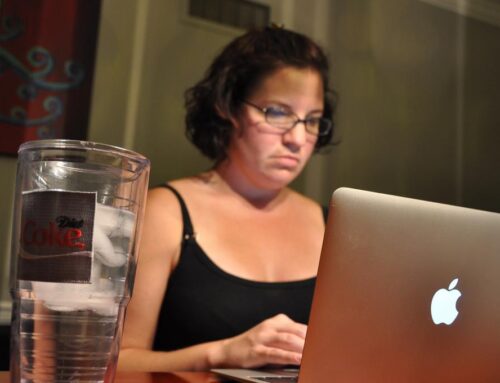Several years ago, a TED Talk by Brené Brown started becoming all the rage in the world of business and higher education leadership, and since then, I’ve seen more than a few people in upper administration at various institutions reference it and the need to be more vulnerable at work. I have to say that I find this utterly fascinating. (If you have never heard me use the term “fascinating” in context before, let me just explain that when I do, I typically mean nothing good by it.) And I encourage you to be vulnerable at your own risk.
What Does It Mean to Vulnerable?
I realize that I’m using vulnerable as a verb, when it is most grammatically not, but I feel like using it this way captures the idea I’m trying to get across. Think before you drink – because who knows what might happen when your brain is impaired. You think before you speak – to make sure you really want to share what’s in your head in that space. So think before you vulnerable – because it may be one of the riskiest things you can do.
To vulnerable – to me – means to show the people you are with your whole self. I don’t just mean your work self, or even parts of your personal self, but your whole self. No, it’s not all the Wonder Woman paraphernalia in my office or even the snarky graphic t-shirts that have become a part of my workday uniform – although those do provide a peek at my general mindset some days. It’s also the fact that I sometimes hate talking to people, I have depression and anxiety, and I almost never have a good answer to the question, “What makes you get out of bed in the morning?”, among other things. It’s the stuff deep, deep down inside that I’m sometimes ashamed of but that still make up essential parts of who I am.
And to vulnerable, I have to be and share all of those things with someone else. And now you’re telling me I should do that at work?
Vulnerability at Work Doesn’t…Work
One of the biggest issues with leaders who insist on vulnerability at work is that the majority of the time, they have not created an environment safe enough for people to vulnerable. Read that again: In order to ask vulnerability of someone, you must make it safe enough for them to take that risk.
The biggest issue with Brené Brown is that people believe her ideas are digestible enough for them to vulnerable after watching a 20-minute TED Talk. (Don’t get me wrong – I have learned a lot from Brené. And I promise not all of my posts – or even most of them – will be about her.) The reality is that it takes years to truly learn and be comfortable enough to vulnerable. To create a space where people can vulnerable outside a therapy session? I’m not sure I’ve seen one yet.
And yet, we have leaders who show Brown’s videos, read Brown’s books, and then insist that it’s safe to be vulnerable with them, it’s safe to be vulnerable in that workplace. The reality is, it is no such thing.
The average person is not ready for your vulnerability, and even less ready for your vulnerability at work. While many of us continue to demand better workplaces and better leaders, we are not there yet. We are especially not there for people of color, people who are not cisgender, people who are not heterosexual, and people who have disabilities, among others.
Vulnerable at Your Own Risk
The worst part of this is not that we’re not ready for vulnerability in the workplace, but that we don’t seem to know we’re not ready. So we insist it’s safe to be vulnerable, but we can’t possibly ensure that safety. Even if – and it’s a strong if – a leader is ready for someone to be vulnerable with them, they can’t ensure that our co-workers and colleagues are ready for that same level of vulnerability. It is extraordinarily challenging to ensure that someone’s vulnerability may not be used against them at a later point.
So does this mean you can never be vulnerable at work? I’d say my own experience shows that it is actually possible – but I have been vulnerable while knowing that I’m taking a huge risk. I’ve been vulnerable as a white, cisgender, straight woman. And I’ve been vulnerable and paid for it.
I hope that some day there are more places that are safe enough for us to vulnerable without risk (or at least with minimal risk), but until then, I encourage you to think before you vulnerable.






Thank you for this! I will always be supportive of people who choose vulnerability at work, but I won’t hold it against someone who doesn’t either. I think what gets extra dangerous about the idea of vulnerability is that people do it on a give and take basis. Because they have chosen “to vulnerable” they expect you to as well, and when you don’t, they somehow think your working relationship is now somehow unequal. The other problem with vulnerability is that it’s too often misconstrued for authenticity, which while they can intersect, they also exist on separate planes. We need to remind people that they don’t owe anyone at work (especially those in student affairs who also work with students) vulnerability. You can be very effective at your job without revealing yourself or letting people in past certain walls.